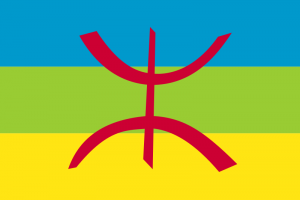Difference between revisions of "Language/Standard-moroccan-tamazight/Grammar/Possessive-pronouns"
Jump to navigation
Jump to search
| Line 1: | Line 1: | ||
[[File:Berber-Language-PolyglotClub.png|thumb]] | |||
<div style="font-size:300%">Possessive Pronouns in Berber</div> | |||
__TOC__ | |||
==Possessive Pronouns== | |||
{| class="wikitable" | {| class="wikitable" | ||
! colspan="2" |possessive pronouns (singular) | ! colspan="2" |possessive pronouns (singular) | ||
| Line 33: | Line 37: | ||
|_nsnt | |_nsnt | ||
|} | |} | ||
In | ==Example== | ||
In Tamazight a suffix ending may be added to the end of words in order to express possession. | |||
For example: | For example: | ||
Revision as of 11:35, 13 October 2021
Possessive Pronouns in Berber
Possessive Pronouns
| possessive pronouns (singular) | possessive pronouns (plural) | ||
|---|---|---|---|
| English | Tamazight | English | Tamazight |
| My | _nu/inu* | Our | _ngh |
| Your(m) | _nk | Your(m) | _nun |
| Your(f) | _nm | Your(f) | _nknt |
| His | _ns | Their(m) | _nsn |
| Her | _ns | their(f) | _nsnt |
Example
In Tamazight a suffix ending may be added to the end of words in order to express possession.
For example:
- My mother = ima+nu
- His mother=ima+ns
- ima = mother
